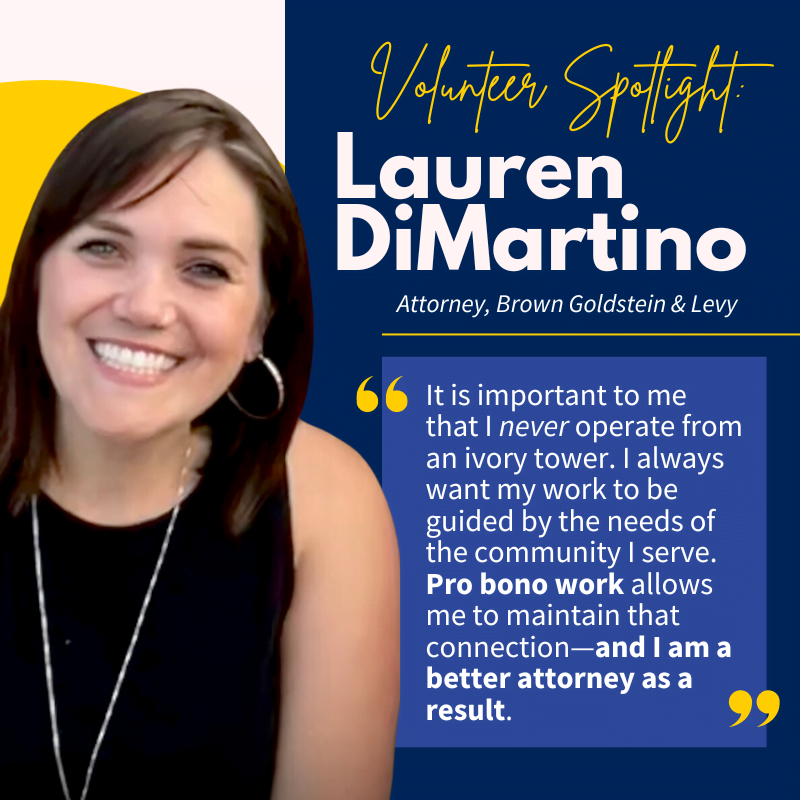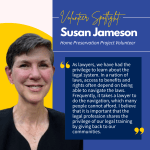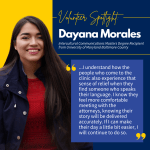Volunteer Profile: Lauren A. DiMartino, Esq.
 What brought you to your legal career? And why in Maryland?
What brought you to your legal career? And why in Maryland?
Prior to becoming an attorney, I worked in New York City community colleges as an academic counselor and the Assistant Director of ASAP, an accelerated education program aimed at removing systemic barriers to obtaining a degree. I felt frustrated by the barriers my students were encountering in their endeavors to better their lives and was looking for tools that would allow me to help in a more systemic way—so I went to law school at night while continuing to work with students. I graduated from the City University of New York School of Law, a public-interest program, with a concentration in Social Justice, Equality, and Civil Rights. After law school, I clerked on the U.S. Sixth Circuit, and I thought I’d move back to New York, but a mentor recommended I check out Brown Goldstein & Levy. Not only was the firm the right fit, but Baltimore felt like a community where I could see myself growing roots. I’m here for the long haul.
Can you tell me a little about your private practice?
My practice centers around supporting vibrant, inclusive, and accessible communities. With a focus on the Fair Housing Act, I assist individuals impacted by discriminatory conduct and to challenge systems perpetuating segregation, with a particular interest in the intersection of housing and public education. I also represent clients with claims under the Americans with Disabilities Act, Title IX, Title VII, and Section 504 of the Rehabilitation Act of 1973 to advocate for equity in education and employment. I also do some work in small/medium business advocacy and representation—assisting local businesses in resolving business disputes and supporting their ability to prosper under local, state, and federal laws. Ultimately, my goal is to fight for equity across the board for each of my clients – ensuring that everyone has the same opportunity to thrive as each one of their peers.
Which of PBRC’s projects do you volunteer with, and how did you get involved?
I volunteer with the Eviction Prevention project at PBRC. As a Fair Housing attorney new to Baltimore, it felt important to put myself in a position to help and learn from people throughout the city. Federal litigation is typically pretty slow moving with few opportunities for immediate impact. Volunteering in rent court affords me the chance to assist clients with immediate and profound challenges to their livelihood—ensuring they can stay in their home—and to keep a pulse on the issues people are facing in their communities and the types of policies that we should be advocating for to secure broad access to safe, stable, and healthy neighborhoods. It’s also a great opportunity to get on my feet and argue before a judge on a regular basis—my confidence in that role has grown exponentially since I started volunteering with PBRC.
What is the problem this project addresses, and what do you do as a volunteer to help? Did the pandemic exacerbate this problem in any way that you’re still seeing today?
The pandemic was a real challenge for the ability of families to stay in their homes. Most people faced unemployment, sickness, loss of childcare, or the death of loved ones—making rent difficult to pay consistently and the alternative of going to a shelter during a global pandemic was terrifying. The rent stipends to aid people in staying in their homes helped, but tenants were required to jump through a few bureaucratic hoops to get them. Now, the stipends are mostly gone but the problems from the pandemic continue to plague communities. The Eviction Prevention project assists tenants with avoiding eviction by challenging the merits or enforcing procedural safeguards of the eviction process, negotiating with landlords to make it possible for families to stay in their homes (at least temporarily), and—most importantly—ensuring tenants’ voices are heard by the court during the eviction process. We don’t always get evictions thrown out or delayed, but we are at least able to empower the clients we’re working with and ensure they have the information they need to reach out for other types of assistance.
How does the project make it easy to volunteer?
I love the way this project is set up because I’m able to volunteer in short spurts of time when I know I don’t have conflicts. With the peaks and valleys of litigation, it is not always easy to tell when you have the bandwidth to take on a new case start to finish. But volunteering in rent court allows me to sign up for a four-hour slot where I can assist several clients and not have much (or anything) to follow up on after the fact.
How important do you think pro bono work is to the legal profession?
It is a professional, personal, and moral obligation of attorneys. Our education and licenses yield so much power, and to not use that to help the community in some way is unjust. It also supports our growth as attorneys. It is important to me that I never operate from an ivory tower. I always want my work to be guided by the needs of the community I serve. Pro bono work allows me to maintain that connection—and I am a better attorney as a result.
What message would you give to attorneys thinking about volunteering?
Don’t think twice! Working in a new area of law can be intimidating but PBRC ensures you have as much (or as little) support as you need to effectively serve clients. An opportunity that allows you to gain new skills and help people in need—with manageable and predictable time commitments—feels like a no-brainer.
For more information about volunteering in Maryland, please contact: education@probonomd.org







